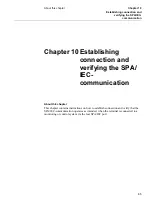
75
Preparing for test
&KDSWHU
9HULI\LQJVHWWLQJVE\VHFRQGDU\
LQMHFWLRQ
6HUYLFH5HSRUW6HUYLFH9DOXHV
,QMHFWDXQV\PPHWULFDOWKUHHSKDVHFXUUHQWDQGYROWDJHDWUDW
HGYDOXHLQWZRSKDVHV
&RPSDUHWKHLQMHFWHGYDOXHZLWKWKHPHDVXUHGYDOXH
The phasor menu is located in the local-HMI under:
6HUYLFH5HSRUW3KDVRUV3ULPDU\DQG6HFRQGDU\
5HOHDVLQJWKHIXQFWLRQVWREHWHVWHG
The user can release the function(s) to be tested. This is done in order to set only the
tested function(s) in operation and prevent other functions from operating. The user can
release the tested function(s) by setting the corresponding parameter under BlockFunc-
tions to NO in the local HMI. When testing a function in this blocking feature, remem-
ber that not only the actual function must be activated, but the whole sequence of
interconnected functions (from measuring inputs to binary output contacts), including
logic and so on. Before starting a new test mode session the user should scroll through
every function to ensure that only the function to be tested (and the interconnected ones)
are set to NO. A function is also blocked if the BLOCK input signal on the correspond-
ing function block is active, which depends on the configuration. The user should there-
fore ensure that the logical status of the BLOCK input signal is equal to 0 for the tested
function. The user could also individually block event blocks to ensure that no events
are reported to remote station during the test.
3URFHGXUH
%URZVHWRWKHµ%ORFN)XQFWLRQV¶PHQX
The BlockFunctions menu is located in the local HMI under:
7HVW7HVW0RGH%ORFN)XQFWLRQV
%URZVHWRWKHIXQFWLRQWKDWVKRXOGEHUHOHDVHG
Use the left and right arrow buttons. Press ‘E’ when the desired
function has been found.
1RWH
7KHIXQFWLRQLVEORFNHGLIWKHFRUUHVSRQGLQJVHWWLQJXQGHUWKH%ORFN)XQFWLRQVPHQXUH
PDLQVRQDQGWKH7(67,1387VLJQDOUHPDLQVDFWLYH$OOIXQFWLRQVWKDWZKHUHEORFNHG
RUUHOHDVHGIURPSUHYLRXVWHVWPRGHVHVVLRQDUHVWLOOYDOLGZKHQDQHZWHVWPRGHVHVVLRQ
LVHQWHUHG
Summary of Contents for REL 551 2.3 Series
Page 16: ...10 Note signs KDSWHU 6DIHW LQIRUPDWLRQ ...
Page 44: ...38 Checking the binary I O circuits KDSWHU KHFNLQJ WKH H WHUQDO FLUFXLWU ...
Page 52: ...46 Checking the self supervision signals KDSWHU QHUJLVLQJ WKH WHUPLQDO ...
Page 140: ...134 Testing the interaction of the distance protection KDSWHU 7HVWLQJ WKH SURWHFWLRQ V VWHP ...













































